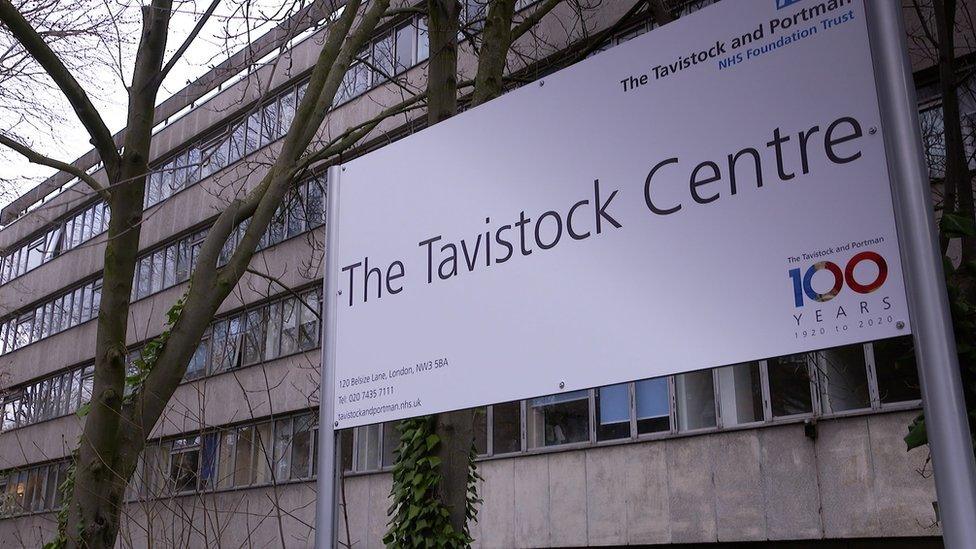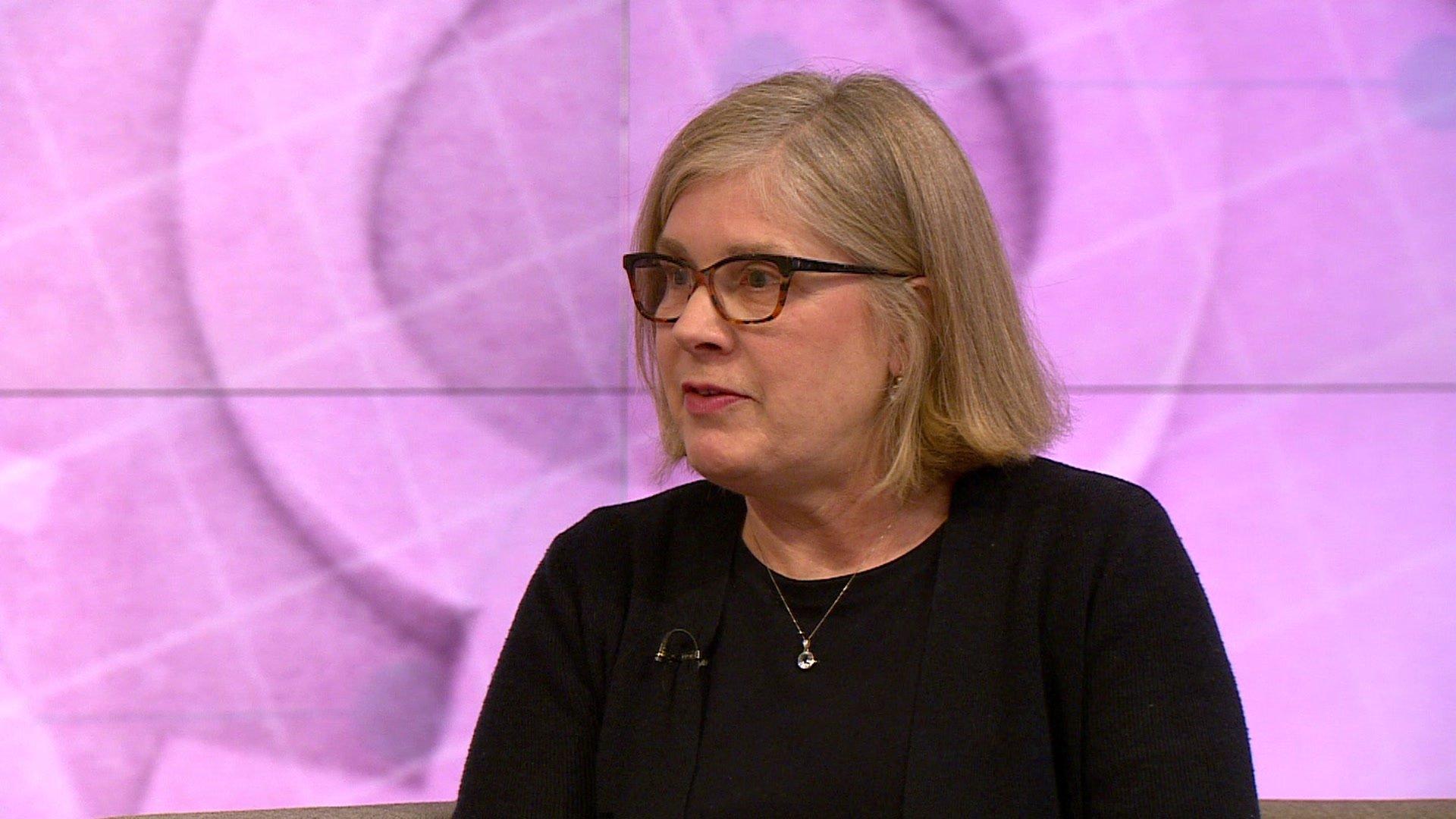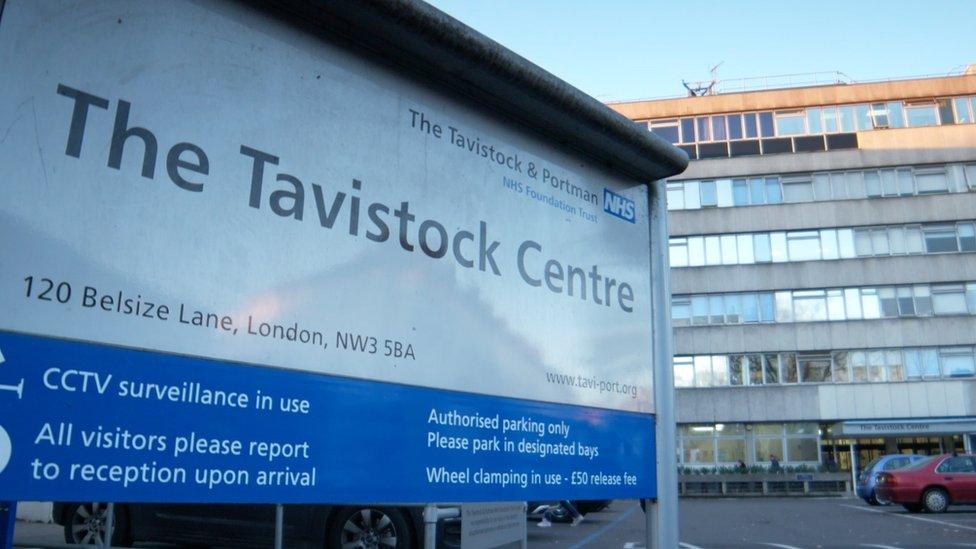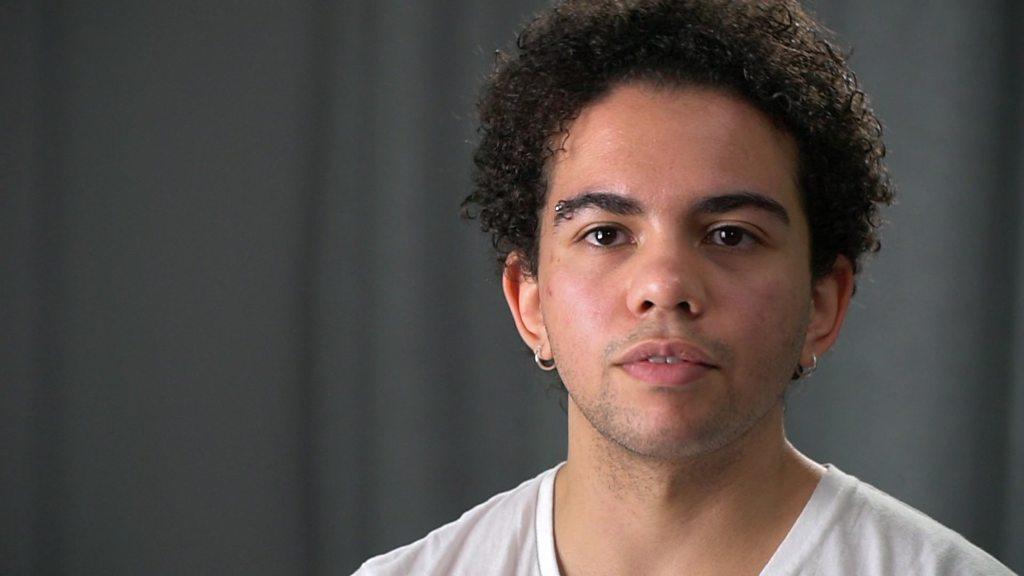NHS child gender clinic: Staff concerns 'shut down'
- Published

The Gender Identity Service is based at the Tavistock and Portman NHS Trust
Staff at England's only children's NHS gender clinic say concerns about patient welfare were shut down, leaked documents reveal.
Clinicians reported worries that some patients were referred onto a gender transitioning pathway too quickly.
BBC Newsnight has seen transcripts of staff interviews from a review into the Gender Identity Development Service.
The Tavistock and Portman NHS Trust, which runs the service, defended the review and its practices.
The review was published in Spring 2019 after the Trust asked its medical director, Dr Dinesh Sinha, to investigate serious concerns about children's welfare raised by staff in an internal report.
BBC Newsnight has read transcripts of some of the interviews conducted with staff as part of the review.
The Trust said it had not identified any immediate issues in relation to patient safety or the overall approach taken by the gender identity service (GIDS), yet in the transcripts clinicians claim child protection and safeguarding concerns were "shut down".
In the transcripts, staff are damning in their assessment of some parts of the service
"Let's pray that I am wrong because if I am not wrong, very many vulnerable children have been very poorly treated and will be left with, potentially, a lifetime of damage here," one says.
"The reality is, by not doing anything, children are potentially still being medically mismanaged."
The Tavistock - like other NHS organisations - has a named person clinicians can turn to discuss specific safety concerns.
But staff allege they were discouraged by GIDS Director Polly Carmichael from going to see the Trust's safeguarding lead, and from referring cases to social services.

Dr Polly Carmichael was interviewed on the BBC's The Victoria Derbyshire Show earlier this year
According to the transcripts, these included cases where staff feared a child had suffered sexual abuse or trauma.
"In all of my previous work, if you had a concern, you refer them on," it's claimed.
"And that did not happen."
Approach felt 'unsafe'
The Trust said a safeguarding lead was created specifically for GIDS in August 2018 to reflect the growth in the service.
But in their interviews, staff didn't view this as adequate and argued there was wide variation in practice at GIDS.
"There was a very clear message from senior management about being really cautious about how we talk to the safeguarding team at the Tavi[stock], and specifically [the Trust's safeguarding lead]."
Staff have told Newsnight this approach felt unsafe.
"I would say that perhaps that's why more than 40 clinicians decided to leave the service within three years," one, who left GIDS last year, told the BBC.
The review acknowledges staff had raised concerns over a period of years. But staff claim in the transcripts that when they did so, they were seen as the problem.
"People who raise concerns are seen as trouble making and difficult," one staff member argued.
"When I raised concerns I was told that I had to toe the line or I would never progress in my career," another said.

It's unlikely all staff will have been as critical of GIDS as the ones whose interviews were read by Newsnight.
But the number of transcripts seen by Newsnight amount to a sizeable proportion - albeit a minority - of the total number of frontline GIDS staff interviewed for the review.
The Tavistock and Portman Trust said it "stands by" the 2019 review of GIDS and is "confident that it fairly addressed the issues raised".
"Safeguarding is of the utmost importance to the Trust," it added.
Puberty blockers
The transcripts detail a range of worries about the service.
Homophobia in families attending GIDS is mentioned in all the transcripts Newsnight has seen.
As well as seeing young people struggling with their sexuality, staff say some parents appeared to prefer their children to be transgender and straight, rather than gay.
In one example, a GIDS clinician describes a young person who had come out as a lesbian and faced homophobic bullying, "within the family and quite openly in school".
"Suddenly the young person changed their mind and they started identifying as trans."
In some of these cases, clinicians thought that it wouldn't be appropriate for the patient to be referred for puberty blockers, with one child apparently saying: "My mum wants the hormone more than I do."
But staff could be overruled by GIDS director Polly Carmichael, the transcripts suggest.

What are puberty blockers?
Puberty blockers stop a young person's body developing breasts, periods, facial hair or a deeper voice.
Recently updated NHS guidance, external on puberty blockers acknowledges that little is known about their long-term effects, or what impact they might have on children's brains and bones
NHS England says young people should only be referred for this treatment after a minimum of three sessions.
Read more: What are puberty blockers?

However, the review heard from several staff that one member of the GIDS leadership, Sarah Davidson, would sometimes refer children for treatment after only one or two appointments.
"Absolutely it should never happen because this is a pathway that will lead to huge, huge changes for this young person, potentially, infertility," one GIDS clinician said.
Such a quick referral, staff claim, could risk putting young people on potentially life-changing medicines who may have been struggling with issues such as their mental health and sexuality.
The Tavistock Trust said "there are many pathways for patients using the service" and many would not be referred on for consideration for hormone blocking drugs.
"GIDS is a safe and caring service which supports a wide range of children,' it said. "[We] strongly refute the allegations put to us by Newsnight," it added.
Newsnight showed some of the transcripts to the Children's Commissioner for England and contacted the healthcare regulator, the CQC.
Both were interested in speaking to the people involved.
The CQC encouraged anyone with specific concerns about safety or safeguarding at the trust to contact them directly. It had been due to inspect GIDS, though routine inspections are currently paused because of the coronavirus pandemic.
You can watch Newsnight on BBC Two weekdays at 22:45 BST or on iPlayer. Subscribe to the programme on YouTube, external or follow on Twitter, external.
- Published22 July 2019

- Published1 March 2020

- Published15 October 2019
